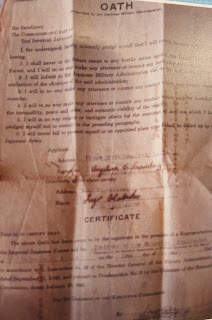Angelina Trinidad
I grew up when the Philippines Negros Island
Angelina Trinidad (left) with the rest of her graduating class
I was 22 years old and had been was working as a nurse just
6 months when war was declared on December 8 1941. I remember this very well
because it was Feast of the Immaculate Conception. We all heard mass and when
we came out of the chapel, Dr. Davies, our Medical Director was by the door
with three American Army officers. They announced, “We are at war! The Japanese
bombed Pearl Harbor !”
There was commotion and confusion. Our nuns who ran the hospital were all Americans and Canadians. We were all crying. Dr. Davies told us that the hospital is being commandeered by the US Army. We were inducted in the USAFE January 13, 1942. Most of the hospital employees—doctors, nurses, technicians, and workers--were inducted into the US Army. We all boarded a boat and were brought to Mindanao where we set up the
We had dug-out foxholes around the hospital. That’s where we all jumped when we heard the sirens because the planes were coming near to bomb. So when we hear that we all run out of the hospital and jump in foxholes. I was scared that time. If we are working on a patient, we just leave them. There were assigned boys to stay and stand watching in each ward. We had 4 or 5 quonset huts: one for surgical patients, one for medical, one for the emotional like shell-shocked and depressed, and then we had one for operating room. We took rotations. I would work in surgical and then medical and then psych ward. We had to work there even though it wasn’t ready. We improvised.
The most scary part of the war was when I saw my first casualty. I think he was hit at the back. We could see his lungs breathing.
We worked in the hospital until we surrendered to the Japanese. After the surrender, they took all the Americans out. I don’t know where they brought them. There were only Filipinos left. And then we didn’t have Japanese patients yet, only Japanese officers coming around.
The oath of allegiance the Japanese made Angelina sign
But then in even not a month, they closed the hospital and brought all the nurses to Bukidnon and made us work in the civilian hospital of that town. And the Filipino men [including a young doctor named Benjamin Locsin with whom Angelina had fallen in love] were brought to a concentration camp near Bukidnon. They were just interned there. And then when the Japanese decided to bring us back to
Benjamin wrote me letters because they had a small cantine in the camp, and some girls sold food and toilet articles there. And Benjamin befriended some of the girls and said, “can I send letters with you?” But it was risky. One time it was not the girls that got caught: one of the boys who worked “detail” at the camp (they call it detail if you are made to work at the camp by the Japanese). He was caught with letters from people outside. He was punished. They were afraid they will kill him but they didn’t. He was just punished. I don’t know how they did it. But the girls were never inspected so Benjamin smuggled his letters through the girls. There were days that the girls go to the camp maybe three times a week and Benjamin already had letters prepared for them to bring to me.



No comments:
Post a Comment